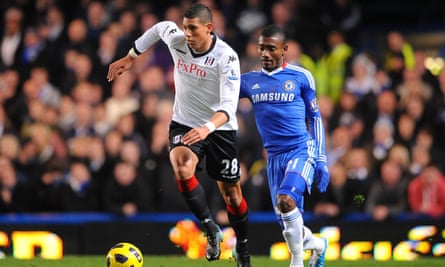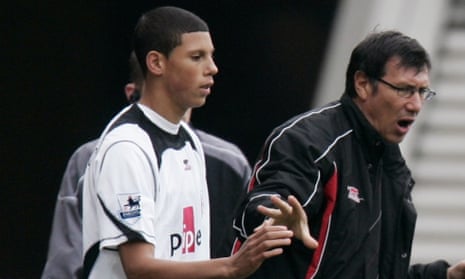Before Arsenal’s Ethan Nwaneri it was Fulham’s Harvey Elliott, and before Elliott it was Fulham’s Matthew Briggs. For 12 years Briggs held the mantle of youngest Premier League debutant, feeling both the joy of the accomplishment but also its considerable weight.
“I’m proud to have had that title and I wouldn’t take it back for the world,” says the 31-year-old. “But there is a part of me that wishes I’d just progressed slowly up the ranks.”
Briggs was aged 16 years and 65 days when he replaced Moritz Volz in Fulham’s 3-1 defeat at Middlesbrough in the final game of the 2006-07 season. On the Saturday he had trained with Lawrie Sanchez’s first-team squad for the first time. On the Sunday he made Premier League history. On the Monday he sat his GCSEs. Success and the trappings of Premier League life beckoned or so the young left-back thought.
“It was so surreal,” reflects Briggs, who now plays semi-professionally for Gosport Borough in the Southern League Premier Division South while working as a fitness and life coach. “As I ran on the pitch the Middlesbrough fans started singing: ‘Who are ye? Who are ye?’ I loved every minute of it.
“The fans were trying to get into my head but I didn’t let it faze me. I did well when I came on, out of position as well in centre midfield, and when I looked up after the game I saw my Mum. She had travelled up and was sat in one of the boxes above the tunnel with the directors. As I was walking back in I looked up and saw her in tears. That’s when I realised what I had achieved.
“I had my GCSEs the next day and when I walked into school it was like I was someone else. Everything went silent for a moment, then everyone was running up to me saying: ‘Oh my God, I saw you on Match of the Day last night’ and started asking for my autograph.
“I was baffled by that, these were people I’d seen every single day. Everyone kind of changed towards me. I wasn’t just an ordinary kid who played football any more.”
What happened next took a toll on Briggs’s mental wellbeing. He takes responsibility for a career that serves as a cautionary tale – ultimately making only 13 league appearances for Fulham over seven years – although he believes the guidance he required after stepping into the spotlight was lacking.
He says: “You never intend to change but I think it changed me and the people around me. New acquaintances I made were bigging me up and I admit it changed me a bit because I was so young. I thought I was the bee’s knees basically and got a bit complacent with it all as the years went on.
“I was the youngest Premier League player and I had this big expectation over my shoulders. What was sad about it was I didn’t actually make another first-team appearance until two years later. That affected me quite badly mentally.
“Because I was so young I didn’t feel I had the right to knock on the door and ask why I wasn’t involved any more. When I made my debut I thought I was going to make it, I was going to be the next James Milner, but when it didn’t happen and I was put back in the youth team I was thinking: ‘Did I not do well? Am I not good enough?’ And no one really gave me any information as to why and that affected me quite badly. It knocked my confidence.

“I remember that season, playing for the under-18s, I didn’t feel like myself for half of the season. Have you seen the film Space Jam, when the NBA players lose their powers? I felt like that, like I’d lost my ability. I’d had such a fast progression – I made my reserve team debut at 14 – and all of a sudden it was stagnant. I didn’t have my first loan until I was 19. I played one game for Leyton Orient, got man of the match, and then got called back. Roy Hodgson was manager at the time and wanted me as back-up for Paul Konchesky and then Carlos Salcido.”
after newsletter promotion
A Premier League career may not have materialised but Briggs has had a well-travelled journey that includes spells at Millwall, Colchester United, two clubs in Denmark, representing England from under-16s to under-21s level and an on-going international career with Guyana.
“My grandma was born in Guyana and moved to England,” he says. “She passed away when I was younger and so I thought it would be a good mark of respect for her and I know she would be proud to see my playing for the country where she was born.
“I’ve been able to travel the world, see beautiful places, represent my country on the international stage and play in major tournaments. It’s been amazing.”
Quick GuideBefore Nwaneri: the youngest players to feature in England's top flight since 1992
Show
Harvey Elliott (Fulham) 16 years, 30 days
The midfielder came off the bench during Fulham's 1-0 loss at Wolves in May 2019. He made one other brief appearance for the Cottagers that season before moving to Liverpool, where he has played 14 times in the Premier League.
Matthew Briggs (Fulham) 16 years, 65 days
The left-back became the Premier League's youngest ever player in Fulham's 3-1 defeat at Middlesbrough in May 2007. He made 29 appearances for the Cottagers. Since leaving permanently in 2015 he has played for a number of clubs in the English lower leagues and Denmark and currently plays for Gosport Borough.
Isaiah Brown (West Brom) 16 years, 117 days
The midfielder, now 19, made his top-flight debut for Albion as a late substitute in their 3-2 loss at home to Wigan in May 2013. He joined Chelsea that summer but only made one substitute appearance for the Blues' first team. He joined Preston in 2021 but was released this year following an injury-hit campaign and is currently without a club.
Aaron Lennon (Leeds) 16 years, 129 days
At the time, the winger became the youngest Premier League player when he came off the bench for Leeds at Tottenham in a 2-1 loss in August 2003. Moved to Spurs two years later and he went on to win 21 England caps. After 10 years at White Hart Lane, Lennon joined Everton in 2015. He has since had two spells with Burnley either side of a year playing in Turkey, but is currently a free agent.
Jose Baxter (Everton) 16 years, 191 days
A 3-2 home defeat to Blackburn in 2008 saw Baxter make his Everton debut as a 78th-minute substitute. He made 13 substitute appearances and two starts before leaving for Oldham in 2012. In July 2015 he was suspended by the FA for failing an out-of-competition drugs test while at Sheffield United, who then suspended him in 2016 for an unspecified reason. He rejoined Everton and then Oldham, before signing for Plymouth in 2019. He retired aged 29 in 2021, after a year playing in the US. PA Media
Briggs now works as an online fitness coach as well as a focus and mindset coach. He is perfectly qualified to offer advice to Ethan Nwaneri after the Arsenal midfielder made his Premier League debut aged 15 years and 181 days against Brentford last Sunday.
“I feel clubs are much more aware of the psychological impact it has on young players now,” says Briggs. “I feel they look after them a lot better and I’ve no doubt that Ethan was fully deserving of his debut.
“I’d just say don’t let it go to your head, keep training hard, stay focused, look after yourself on and off the pitch and stay disciplined. And, if he does have anything that affects him mentally or he’s worried about anything, talk to somebody. It will be better for him in the long run.
“And just enjoy it. It’s a short-lived career. When I was making my debut I thought it would never end and before I knew it I was 31. Enjoy it while it lasts.”
